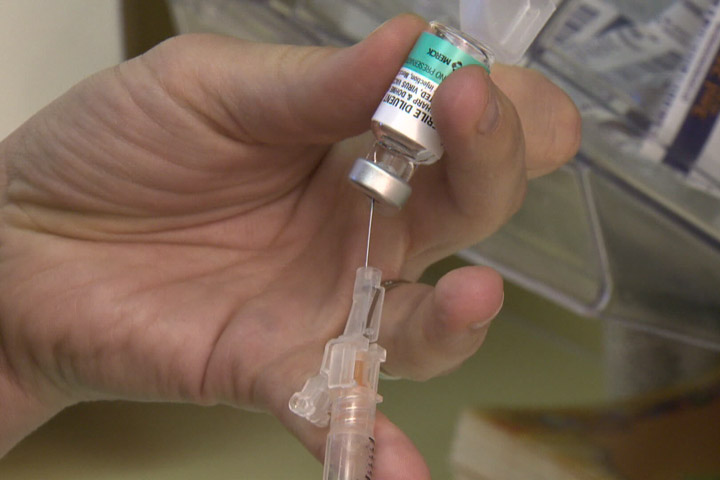TORONTO — It’s new research that may have come in handy for concerned parents as a measles outbreak spread through parts of Canada last year: childhood vaccines are safe and don’t lead to autism, a scientific review suggests.

The vaccines may lead to some side effects, but autism, food allergies and cancer aren’t factors, despite what a growing anti-vaccination movement may allege.
“We found evidence that some vaccines are associated with serious adverse events; however, these events are extremely rare and must be weighed against the protective benefits that vaccines provide,” the study authors wrote.
The review was based on 67 papers hand-picked by the scientists based on their study controls, comparison groups and relevance to their analysis. The team narrowed down their research from 20,000 recent papers.
READ MORE: Anti-vaccination movement means preventable diseases making a comeback
The researchers said that worried parents have refused vaccines for their kids, causing disease to spread through communities. Their hope was to get to the root of the concerns to see if they held any merit.
Turns out, the measles, mumps and rubella vaccine — dubbed MMR — may lead to fever and seizures, findings that Canadian researchers suggested earlier this year.
But there was “strong evidence” that autism and the vaccine aren’t linked, contrary to what celebrity moms told the public.
In a contentious finding from the review, the varicella vaccine — which protects against chicken pox — may contribute to developing infections or allergic reactions.
READ MORE: Which Toronto schools have the lowest measles vaccination rates?
Meanwhile, the rotavirus vaccine was linked to risk of intussusception, which is when one part of the intestine slides into another part.
But keep in mind: these severe side effects are extremely rare at about one to five in 100,000 the researchers said.
None of the vaccines studied led to death.
READ MORE: What caused a whooping cough epidemic? Scientists blame parents
The research also called vaccines “one of the greatest public health achievements of the 20th century for their role in eradicating smallpox and controlling polio, measles, rubella, and other infectious diseases in the United States.”
The findings were published in the journal Pediatrics, and at a tumultuous time, as parents and health officials spar over the safety of vaccines. (Read the full study here.)
Last month, a Canadian study suggested that the combined MMRV vaccine may cause febrile seizures in young children more so than separate inoculations.
READ MORE: 6 vaccination myths debunked
But the Calgary doctors leading the research reassured the public: these vaccines are completely safe and risk of seizures is rare.
“Parents should be assured that we are continually monitoring vaccine safety and watching for rare adverse events. It is reassuring that the extra risk is still very low…” said lead researcher Dr. Shannon MacDonald.
“The most important thing is to vaccinate your child, whether it is with separate or combination vaccines,” she told Global News.
carmen.chai@globalnews.ca
Follow @Carmen_Chai


Comments